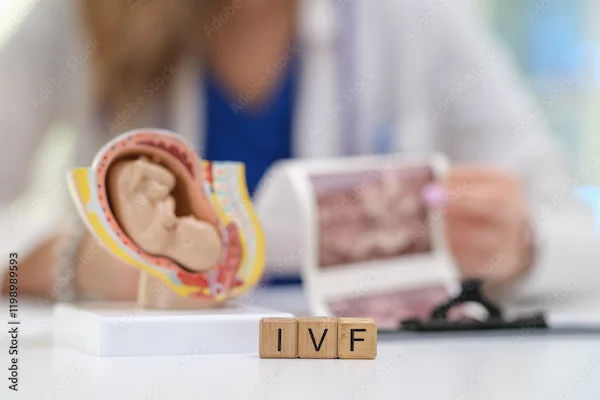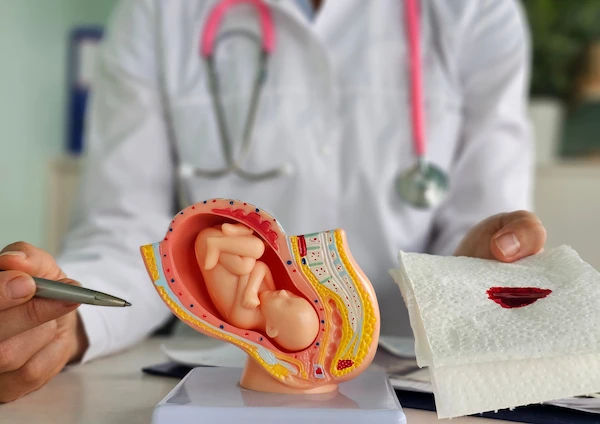Mucus Plug Functions and Actions
Explore the functions of the mucus plug, how it protects the uterus, and what to do if it’s lost during pregnancy

Written by
Last updated on 3rd Jul, 2025
Mucus plugs act like a natural protector in the body, preventing germs that can enter and sterile the sensitive areas. They are a thick, gelatinous material formed from mucous membranes in the body. It comprises mainly water, glycoproteins, enzymes, and immune cells. Mucus plugs are essential for the upkeep of well-being and ensuring different organs function properly as they entrap pathogenic microorganisms, debris, and foreign particles. Typically, it serves as a protective sealant, helping to keep pathogens out of the reproductive, respiratory, and gastrointestinal tract. It is a crucial part of the body’s immune defence, which reduces the possibility of infections.
Mucus Plug in Pregnancy
The role of mucus plugs as the protective barrier is more pronounced in their participation in ensuring proper foetal growth. Here is how they help –
Formation during Pregnancy: The mucus plug grows in the cervix during pregnancy and seals off the uterus from the external environment. It continuously regenerates to remain effective against threats that might develop during pregnancy.
Foetal Protective Functions: This natural seal protects the foetus against bacteria and other pathogens, keeping the developing foetus sterile. In the third trimester of pregnancy, the passage of the mucus plug indicates the body is gearing up for labour, but the timing can vary among individuals.
Other Roles of the Mucus Plug
Besides its role in pregnancy, mucus plugs also help in safeguarding other parts of the human body. Here is more on that –
Mucus Plug of the Respiratory System: Mucus plugs in the respiratory system trap dust, allergens, and microorganisms before they can reach the lungs. The significant issues in conditions like asthma or chronic obstructive pulmonary disease (COPD) derives from too much mucus being produced or blockage due to hardened mucus plugs. This excessive mucus production is the result of chronic inflammation.
Digestive Health and the Mucus Plug: Mucus also lines the stomach and intestines, protecting mucosal surfaces from digestive acids and enzyme irritation. Mucus plugs may temporarily form in response to infections or inflammation, helping and facilitating healing.
Signs and Symptoms of Mucus Plug Loss
Knowing the signs of mucus plug loss is crucial to determine whether medical attention is needed, especially for pregnant individuals or those with a chronic health condition. Here are some of the significant signs of mucus discharge –
Coughing
Wheezing
Shortness of breath
The sensation of choking
Postnatal drip
Besides these common signs, which are primarily associated with respiratory problems, mucus plugs are also expelled during pregnancy. They appear as a thick, jelly-like substance that can be clear, white, or tinged with blood. The loss of mucus plugs during pregnancy is usually normal. However, medical attention is necessary when individuals experience certain symptoms like heavy bleeding, a foul-smelling discharge, or symptoms of preterm labour, including contractions before 37 weeks.
Consult Top ENT Specialists
Potential Complications Involving Mucus Plugs
Despite being protective, mucus plugs can sometimes create complications or indicate one that requires medical treatment. Here are some cases where mucus plugs indicate underlying health conditions –
Respiratory Issues
Problems like breathing difficulties and choking are often indications of mucus accumulation, which underlines conditions like asthma and COPD. The ongoing obstruction from hardened mucus plugs can hinder ideal oxygen-to-infection exchange within the lungs, leading to these conditions.
Apart from the obvious respiratory problems, mucus plugs also indicate other issues related to the lungs, such as –
Cystic Fibrosis: It is a genetic disorder that causes thick, sticky mucus to accumulate in the lungs, leading to frequent infections.
Pneumonia: Here, the mucus plugs can trap bacteria in the lungs, leading to lung infections.
Atelectasis: Here, the mucus plugs lead to a complete or partial lung collapse.
Pregnancy-Related Complications
Mucus plugs also cause several complications during pregnancy. The premature loss or abnormal changes in the mucus plug may indicate potential complications like –
Preterm Labour: If the mucus plug is lost before 37 weeks of pregnancy, it may signal early cervical dilation and potential preterm labour.
Infections: A foul-smelling, greenish or yellowish mucus plug may indicate an infection in the reproductive tract.
Placental Abruption: If mucus plug loss is accompanied by heavy bleeding, severe abdominal pain, or contractions, it may indicate placental abruption (when the placenta detaches from the uterine wall prematurely).
Premature Rupture of Membranes (PROM): If the mucus plug is lost along with a gush or trickle of fluid, it may indicate the breaking of the amniotic sac (water breaking) before labour begins.
Therefore, effective management of mucus plus is essential to avoid complications and find relief –
Drinking plenty of fluids and using humidifiers help to keep mucus thin and easier to clear.
Techniques like controlled coughing, deep breathing exercises, and postural drainage can help clear mucus.
If mucus plugs contribute to infections like pneumonia, antibiotics may be necessary.
Steroids are used to relax the airways and reduce inflammation in conditions like asthma and COPD.
In severe cases, medical interventions like suctioning or bronchoscopy are used to remove mucus plugs.
Conclusion
Mucus plugs play a vital role in protecting the body from infections and maintaining organ function. However, excessive build-up or premature loss can signal underlying health concerns, particularly in respiratory conditions and pregnancy. So, proper management, hydration, and medical intervention when necessary can help prevent complications, ensure overall well-being, and eliminate any potential complications that can arise in the long term.
Consult Top ENT Specialist
Consult Top ENT Specialists

Dr. Sourav Banerjee
Ent Specialist
5 Years • MBBS, MS (Otorihnolaryngology)
New Delhi
THE DOCTORS NESST, New Delhi
Dr. Shalu Sharma
Ent Specialist
14 Years • MBBS, DLO, DNB (ENT)
Delhi
Salus Advanced ENT Care, Delhi

Dr. Krishan Rajbhar
Ent Specialist
8 Years • MBBS, MS(ENT), Fellowship in Neurotology Fellowship in Middle Ear Surgery & Cochlear Implant, Fellowship in Allergy & Asthma
Kolkata
Dr. Krishan Rajbhar's Clinic, Kolkata
(150+ Patients)

Dr. M Venkata Apparao
Ent Specialist
25 Years • MBBS MS
Visakhapatnam
Apparao ENT CLINIC, Visakhapatnam

Dr. Nirupama Reddy
Ent Specialist
5 Years • MBBS, MS (Oto Rhino Laryngology)
Hyderabad
Nirupama clinic, Hyderabad
Consult Top ENT Specialist

Dr. Sourav Banerjee
Ent Specialist
5 Years • MBBS, MS (Otorihnolaryngology)
New Delhi
THE DOCTORS NESST, New Delhi
Dr. Shalu Sharma
Ent Specialist
14 Years • MBBS, DLO, DNB (ENT)
Delhi
Salus Advanced ENT Care, Delhi

Dr. Krishan Rajbhar
Ent Specialist
8 Years • MBBS, MS(ENT), Fellowship in Neurotology Fellowship in Middle Ear Surgery & Cochlear Implant, Fellowship in Allergy & Asthma
Kolkata
Dr. Krishan Rajbhar's Clinic, Kolkata
(150+ Patients)

Dr. M Venkata Apparao
Ent Specialist
25 Years • MBBS MS
Visakhapatnam
Apparao ENT CLINIC, Visakhapatnam

Dr. Nirupama Reddy
Ent Specialist
5 Years • MBBS, MS (Oto Rhino Laryngology)
Hyderabad
Nirupama clinic, Hyderabad




